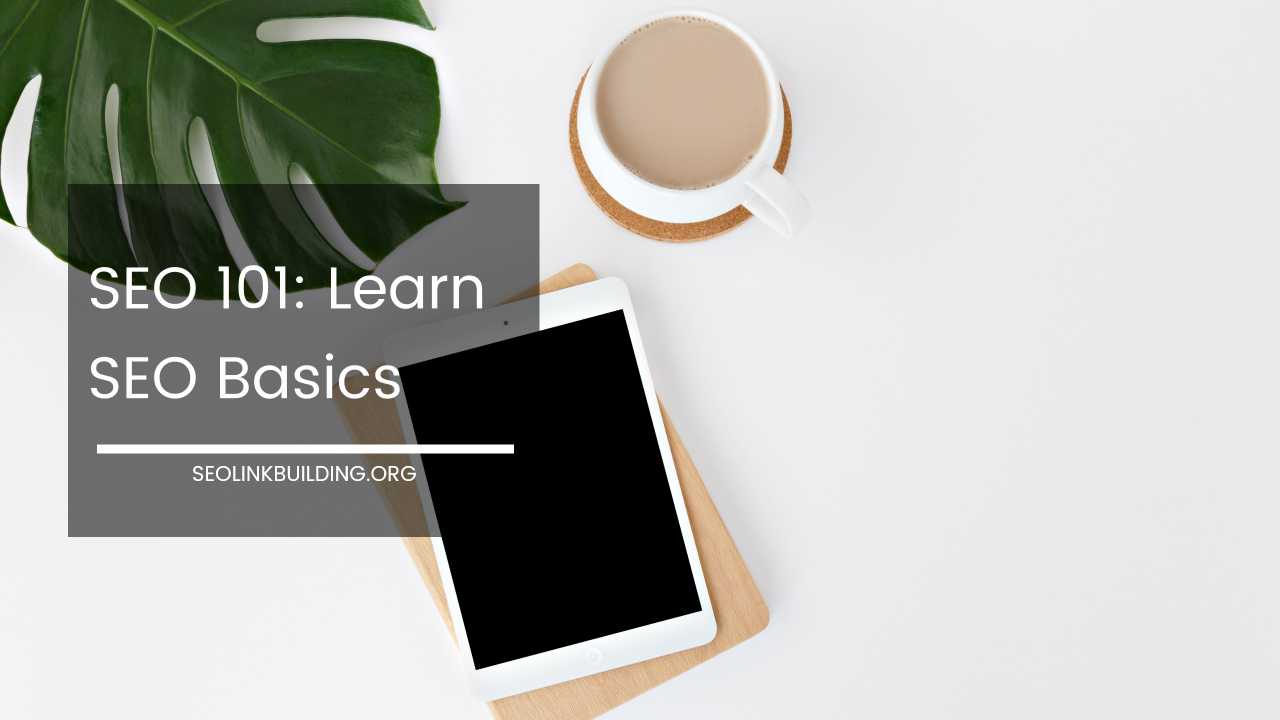SEO 101: Learn SEO Basics

SEO 101: Learn SEO Basics and Boost Your Website Traffic
In today’s digital landscape, having a website alone is akin to owning a prime storefront on a deserted street. To thrive online, you need your website to be seen by the people who matter most – your target audience.
This is where Search Engine Optimization (SEO) comes in, acting as the flashing neon sign and welcoming committee that draws customers through the virtual door.
What is SEO?
SEO is the art and science of improving the ranking and visibility of your website in organic search engine results pages (SERPs).
Simply put, it’s about getting your website discovered by the right people at the precise moment they’re searching for information or products related to your niche.
When a user types a query into a search engine like Google, complex algorithms determine which websites appear on the coveted first page.
Effective SEO helps your website climb the ranks and land in those top positions, driving a surge of organic traffic that fuels your online success.
Why is SEO Important?
The benefits of SEO extend far beyond vanity metrics. Here’s a breakdown of why SEO should be a cornerstone of your online marketing strategy:
- Increased Website Traffic: Higher ranking in search results translates to a dramatic increase in the number of people who see your website. This organic traffic is particularly valuable because it consists of users actively seeking information or products related to your offerings. They’re already primed to engage with your content, making them more receptive to your message.
- Enhanced Brand Awareness: Greater visibility in search engines leads to improved brand recognition. As your website appears more frequently for relevant searches, users become familiar with your brand and are more likely to trust you as a reliable source of information. This can lead to increased brand loyalty and customer advocacy.
- Improved Lead Generation and Sales: With more targeted traffic, you have a higher chance of converting visitors into leads and ultimately, customers. Effective SEO attracts users who are genuinely interested in what you offer, making them more receptive to your call to action. By providing valuable content and a seamless user experience, you can nurture leads through the sales funnel and convert them into paying customers.
- Cost-Effective Marketing: Unlike paid advertising, SEO is an organic strategy that delivers long-term results. Once your website is optimized, you can continue to reap the benefits without ongoing financial investment. SEO requires an initial investment of time and effort, but the returns can be substantial and sustainable over time.
Understanding How Search Engines Work
To optimize your website for search engines, it’s essential to demystify their inner workings. Here’s a simplified breakdown of the search engine process:
- Crawling: Search engines employ software programs called crawlers or spiders to discover new and updated web pages. These tireless digital explorers navigate through the vast web, meticulously following links from one page to another, building a comprehensive map of the internet.
- Indexing: Once a crawler discovers a page, it adds it to the search engine’s massive database, known as the index. This is like filing a document in a library for easy retrieval later. The index categorizes and stores web pages based on various factors, making them accessible when users submit search queries.
- Ranking: When a user enters a search query, the search engine retrieves relevant web pages from its index. However, not all pages are created equal. Search engine algorithms, like Google’s complex PageRank, analyze various on-page and off-page factors to determine which pages deserve the top spots. These factors include the relevance of the content to the search query, the quality and authority of the website, and the user experience it provides.
SEO 101: The Core Principles
Now that you grasp the importance of SEO and how search engines work, let’s delve into the core principles that will equip you to optimize your website and climb the search engine rankings:
- Keyword Research: The Foundation of SEO
Keywords are the building blocks of SEO. They are the terms and phrases users type into search engines to find information. Identifying relevant keywords with high search volume and low competition is crucial for SEO success.
Keyword research tools like Google Keyword Planner, SEMrush, and Ahrefs can help you discover the right keywords to target.
But remember, SEO isn’t just about stuffing your content with keywords; it’s about understanding user search intent. Aim for keywords that reflect the actual questions and problems your target audience is trying to solve.
- On-Page Optimization: Crafting Content Search Engines and Users Love
On-page optimization refers to optimizing the content and structure of your website’s individual pages to improve their ranking for specific keywords. It encompasses several key elements:
-
Title Tags and Meta Descriptions: Title tags are the headlines displayed in search results, while meta descriptions provide a brief summary of your page’s content. Both should be optimized with relevant keywords in a natural way, but also be crafted to be informative and enticing to users. Title tags should ideally be under 60 characters and meta descriptions under 160 characters to ensure they are fully displayed in search results.
-
Headings and Subheadings: Utilize clear and concise headings (H1, H2, etc.) formatted with your target keywords to structure your content and improve readability. Search engines use headings to understand the hierarchy and organization of your content.
-
Content Quality: Create high-quality, informative, and engaging content that provides value to your target audience. Content should be well-written, free of grammatical errors, and address the specific needs and interests of your users. Search engines favor websites with fresh, well-researched content that demonstrates expertise and authority in your niche.
-
Image Optimization: Include relevant images and optimize them with descriptive file names and alt tags containing your target keywords. This not only improves image searchability but also enhances accessibility for visually impaired users.
-
Internal Linking: Create a strong internal linking structure by linking to other relevant pages on your website. This helps search engines understand the relationship between your pages and distributes link equity throughout your site.
-
Mobile-friendliness: In today’s mobile-first world, your website must be responsive and deliver an optimal user experience on all devices. Google prioritizes mobile-friendly websites in search results, so ensuring your website is mobile-optimized is crucial for SEO success.
-
Website Speed: Search engines favor fast-loading websites. Optimize your website’s speed by minimizing image sizes, optimizing code, and using a reliable web hosting provider. A slow-loading website can significantly impact your SEO performance and user experience.
-
Site Structure: Create a clear and logical site structure with a user-friendly navigation system that allows search engines and users to easily crawl and find your content. A well-organized website structure improves user experience and helps search engines understand the hierarchy of your website.
Off-Page Optimization: Building Authority and Trust
Off-page optimization involves building backlinks to your website from high-authority websites. Backlinks act like votes of confidence for your site, influencing search engine ranking. Here are some ways to build backlinks:
- Guest Blogging: Contribute high-quality guest posts to relevant websites in your niche. Include a link back to your website in your author bio.
- Directory Submissions: Submit your website to high-quality online directories relevant to your industry.
- Social Media Engagement: Promote your content on social media platforms to increase brand awareness and drive traffic back to your website.
- Broken Link Building: Find broken links on websites in your niche and reach out to the website owner, suggesting your content as a replacement.
Final Thoughts: SEO – A Journey of Continuous Growth and Adaptation
SEO is an ongoing process that thrives on consistent effort and adaptation. Search engine algorithms are like living organisms, constantly evolving and changing to prioritize the best possible user experience.
Staying informed about the latest trends and best practices is crucial for sustained SEO success. It’s akin to keeping your finger on the pulse of the ever-changing digital landscape.
By implementing the core SEO principles outlined above, you can lay a solid foundation for driving organic traffic to your website, establishing your brand as a thought leader, and achieving long-term success. Here are some additional thoughts to consider as you embark on your SEO journey:
- Content is King, But Context is Queen: While high-quality content remains paramount in SEO, understanding the context in which users search for information is equally important. Don’t just create content; create content that directly addresses the specific questions and challenges your target audience faces. Conduct thorough keyword research to understand user search intent and tailor your content accordingly.
- Embrace User Experience (UX): SEO and UX are two sides of the same coin. A website optimized for search engines should also be optimized for users. Prioritize a seamless user experience by ensuring clear navigation, fast loading times, and a mobile-friendly design. When users find your website informative, engaging, and easy to navigate, they’re more likely to dwell longer, convert into leads, and ultimately become loyal brand advocates.
- Analytics: Your Guide on the SEO Journey Leverage website analytics tools like Google Search Console to track your SEO performance and identify areas for improvement. Monitor your website traffic, track keyword rankings, and analyze user behavior to understand what’s working and what needs tweaking. Data-driven insights gleaned from analytics will guide your SEO strategy and help you make informed decisions to optimize your website for better results.
- The Power of Local SEO: If you have a brick-and-mortar presence or cater to a local audience, don’t neglect local SEO. Optimize your Google My Business listing, build citations in local directories, and create content that targets local keywords to improve your visibility in local search results.
- Stay Updated, Stay Ahead: The SEO landscape is dynamic, and staying updated on the latest trends and best practices is vital. Follow SEO industry publications, attend webinars, and participate in online communities to stay ahead of the curve. Continuous learning ensures your SEO strategy remains relevant and effective in the ever-evolving digital world.
Remember: SEO is a journey, not a destination. It requires dedication, patience, and a willingness to adapt.
But with a well-defined strategy, consistent effort, and a focus on providing exceptional value to your target audience, you can climb the search engine rankings and establish your website as a trusted authority in your niche.
The rewards of a thriving online presence – increased brand awareness, organic traffic growth, and a loyal customer base – make the SEO journey well worth the investment.













